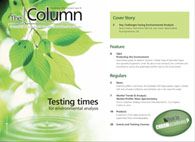Tall Poppy of the Year
Dr Robert Shellie, a senior lecturer at the University of Tasmania (UTAS) school of chemistry, researcher at the Australian Centre for Research on Separation Science (ACROSS) and LCGC Europe EAB member and columnist, has been named 2010 Young Tasmanian Tall Poppy of the Year.
Dr Robert Shellie, a senior lecturer at the University of Tasmania (UTAS) school of chemistry, researcher at the Australian Centre for Research on Separation Science (ACROSS) and LC•GC Europe EAB member and columnist, has been named 2010 Young Tasmanian Tall Poppy of the Year.
The national Tall Poppy Campaign was created in 1998 by the Australian Institute of Policy and Science and recognizes the achievements of Australia’s outstanding young scientific researchers for excellence in research alongside their communication skills and record in community engagement.
“This award is especially thrilling because I see a strong importance in communicating science in a meaningful way outside of my scientific discipline,” Dr Shellie said. “I’m looking forward to continued opportunities for community engagement through the Tall Poppy Campaign.”
Dr Shellie specializes in multidimensional chromatography, developing sensitive techniques to solve complex separation problems. He is currently working with a team of UTAS researchers to develop a blood test that can show if a Tasmanian devil has contracted the Devil Facial Tumour Disease, an aggressive parasitic cancer.
This story originally appeared in The Column. Click here to view that issue.
Removing Double-Stranded RNA Impurities Using Chromatography
April 8th 2025Researchers from Agency for Science, Technology and Research in Singapore recently published a review article exploring how chromatography can be used to remove double-stranded RNA impurities during mRNA therapeutics production.
The Effect of Time and Tide On PFAS Concentrations in Estuaries
April 8th 2025Oliver Jones and Navneet Singh from RMIT University, Melbourne, Australia discuss a recent study they conducted to investigate the relationship between tidal cycles and PFAS concentrations in estuarine systems, and offer practical advice on the sample preparation and LC–MS/MS techniques they used to achieve the best results.










